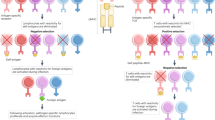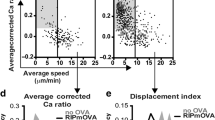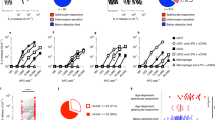Abstract
THE fate of an immature thymocyte is determined by the specificity of its αβ T-cell receptor. Only cells expressing receptors that interact with sufficient affinity with major histocompatibility complex (MHC) molecules expressed on thymus epithelial cells are positively selected and go on to mature and seed the peripheral lymphoid organs1–4. The H–2Kb class-I MHC molecule positively selects for the maturation of cytotoxic ¤ lymphocytes that will respond in the periphery to H–2Kb cells presenting a foreign peptide. We have now analysed the ability of variant H–2Kb molecules to positively select T-cells that respond to H–2Kb with ovalbumin. Our results indicate that self-peptides, presented in the groove of the class-I molecule on thymus epithelial cells, are critically involved in positive selection of the T-cell repertoire. Furthermore, the ability of four different H–2Kb variants to select this response in the thymus correlates with their ability to present the ovalbumin peptide, indicating that a self-peptide mimic of the foreign peptide could be involved in positive selection.
This is a preview of subscription content, access via your institution
Access options
Subscribe to this journal
Receive 51 print issues and online access
$199.00 per year
only $3.90 per issue
Buy this article
- Purchase on Springer Link
- Instant access to full article PDF
Prices may be subject to local taxes which are calculated during checkout
Similar content being viewed by others
References
1. Bevan, M. J. Nature 269, 417–418 (1977). 2. Zinkernagel, R. M. et al. J. exp. Med. 147, 882–896 (1978). 3. Kisielow, P. et al. Nature 335, 730–733 (1988). 4. Sha, W. C. et al. Nature 336, 73–76 (1988). 5. Bjorkman, P. J. et al. Nature 329, 506–512 (1987). 6. Davis, M. M. & Bjorkman, P. J. Nature 334, 395–402 (1988). 7. Claverie, J.-M., Prochnicka-Chalufour, A. & Bougueleret, L. Immun. Today 10, 10–14 (1989). 8. Chothia, C., Boswell, D. R. & Lesk, A. M. EMBO J. 7, 3745–3755 (1988). 9. Nathenson, S. G. et al. A. Rev. Immun. 4, 471–502 (1986). 10. Bjorkman, P. J. et al. Nature 329, 512–518 (1987). 11. Bluestone, J. A. et al. J. Immun. 137, 1244–1250 (1986). 12. Garrett, T. P. J. et al. Nature 342, 692–696 (1989). 13. Moore, M. W., Carbone, F. R. & Bevan, M. J. Cell 54, 777–785 (1988). 14. Ron, Y., Lo, D. & Sprent, J. J. Immun. 137, 1764–1771 (1986). 15. Marrack, P. & Kappler, J. Immun. Today. 9, 308–315 (1988). 16. Marrack, P., McCormack, J. & Kappler, J. Nature 338, 503–505 (1989). 17. Kourilsky, P. & Claverie, J.–M. Celi 56, 327–329 (1989). 18. Ogata, M. ef al. J. Immun. 136, 1178–1185 (1986). 19. Singer, A. et al. Prog. Immun. VI, 60–66 (1986). 20. Fry, A. M., Cotterman, M. M. & Matis, L. A. J. Immun. 143, 2723–2729 (1989). 21. Kast, W. M., deWaal, L. P. & Meleif, C. J. M. J. exp. Med. 160, 1752–1766 (1984). 22. Carbone, F. R. & Bevan, M. J. J. exp. Med. (in the press). 23. Bernstein, l. D., Tarn, M. R. & Nowinski, R. G. Science 207, 68–71 (1980). 24. Marshak-Rothstein, A. et al. J. Immun. 122, 2491–2497 (1979).
Author information
Authors and Affiliations
Rights and permissions
About this article
Cite this article
Nikolić-Z˘ugić, J., Bevan, M. Role of self-peptides in positively selecting the T-cell repertoire. Nature 344, 65–67 (1990). https://doi.org/10.1038/344065a0
Received:
Accepted:
Issue Date:
DOI: https://doi.org/10.1038/344065a0
This article is cited by
-
Thymoproteasome and peptidic self
Immunogenetics (2019)
-
T cells recognizing a 11mer influenza peptide complexed to H‐2Db show promiscuity for peptide length
Immunology & Cell Biology (2015)
-
αβ T cell receptors as predictors of health and disease
Cellular & Molecular Immunology (2015)
-
Antigen capture and archiving by lymphatic endothelial cells following vaccination or viral infection
Nature Communications (2014)
-
Crossreactivity of a human autoimmune TCR is dominated by a single TCR loop
Nature Communications (2013)
Comments
By submitting a comment you agree to abide by our Terms and Community Guidelines. If you find something abusive or that does not comply with our terms or guidelines please flag it as inappropriate.



